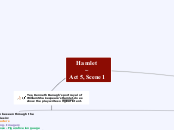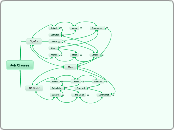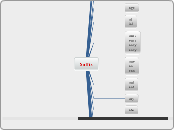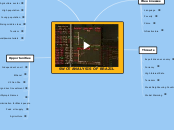Hamlet
~
Act 5, Scene 1
What was the point of this scene?! (Overview of the scene)
Act 5, Scene 1;
- Gravediggers are preparing Ophelia's grave for her burial
- Provides comic relief
- Hamlet and Horatio watch from a distance until Hamlet begins speaking to the Gravedigger
- Hamlet finds out about Ophelia's death in this Act
- Hamlet is overcome with emotion and grief and ends the scene in an outburst of emotion - some would say that Hamlet acts without sanity
-Gertrude, Claudius, Laertes and Priest enter for the burial
-Laertes and Hamlet begin fighting:
-Hamlet try's "out grieving" Laertes
Yes, Kenneth Banagh's portrayal of William Shakespeare's Hamlet, does show the play writes original intent.
In Conclusion:
Banagh masterfully portrays Shakespeare's intent of this scene by staying true to its characters, imagery/setting and the figurative language/purpose.
This can be seen through the similarities in:
1. Characters
2. Setting - Imagery
3. Purpose - Figurative language
that can be seen in Act 5, Scene 1 of the play.
3. Purpose - Figurative language
Banagh also uses the same figurative language as Shakespeare in order to express Shakespeare's original intent for this scene. His purpose for this scene being comic relief and continuation or transition of the plot, is carried out through the high level of figurative language used throughout the scene.
The scene begins with comic relief for the audience as the gravediggers use a mixture of allusions and puns to relieve a lot of the built up anticipation:
OTHER
Was he a gentleman?
GRAVEDIGGER
He was the first that ever bore arms.
OTHER
Why, he had none.
GRAVEDIGGER
What, art a heathen? How dost thou understand the Scripture? The Scripture says Adam digged. Could he dig without arms? (5.1.30-36)
Again, Banagh includes more of the original authors puns;
GRAVEDIGGER
What is he that builds stronger than either the mason, the shipwright, or the carpenter?
OTHER
The gallows-maker, for that frame outlives a thousand tenants. (5.1.39-42)
Imperious Caesar, dead and turned to clay,
Might stop a hole to keep the wind away.
Oh, that that earth, which kept the world in awe,
Should patch a wall t' expel the winter’s flaw! (5.1.193-196)
As both the director and Shakespeare allude to Caesar, they reveal that even the great must some day return to dust, dirt and clay. This part in the film helps to display the authors original intent of the scene through the figurative language used and the way in which the characters present the information/news.
2. Setting - Imagery
In this scene the setting and the imagery used go hand in hand. This scene takes place at the graveyard. In Banagh's portrayal of the play, it the scene takes place at a grave in the middle of the forest, therefore giving the scene a dark and ominous appeal. Through the use of the skulls and the bones which are mentioned and pictured in both the play, as well as the film viewers are able to better imagine the scene and its original purpose.
Other imagery and symbolism used in this scene includes the skulls the gravedigger is removing from the already dug grave. These skulls are representations of past lives. Skulls in literature are usually a symbol or image of mortality and death. In this scene, the gravedigger is seen pulling up the skull of the king's jester who had died many years prior. This brings Hamlet back to the good days of his childhood that was filled with joy, laughter and love throughout his family and Denmark.
1. Characters
This may seem like a general and obvious similarity however in many films that have been created based off of a novel or play, characters are either added (directly or indirectly) or they are changed (personality, appearance, characteristics). In Banagh's portrayal of Hamlet the characters remain the same in the sense that no characters are added nor are they excluded, and the characters remain true to their original purpose of being in the scene. For example, the Gravediggers as well as Hamlet play major parts in this scene as they help carry the plot, carry on different themes and provide comic relief throughout the scene.
Hamlet:
-carries on the plot
-continues the theme that all that lives must one day die:
Alexander died, Alexander was buried, Alexander returneth to dust, the dust is earth, of earth we make loam—and why of that loam, whereto he was converted, might they not stop a beer barrel? (5.1.189-192)
This quote from the play that can also be found in the film, reveals a theme that even the great and powerful will one day die and return to the same dirt and dust that the commoners turn into
The Gravediggers: used in this scene for comic relief
-in this scene the gravediggers are the only ones on scene as they discuss the burial and death of Ophelia and comparing it to the burial of a commoner if he/she were to have died the same way as Ophelia:
And the more pity that great folk should have countenance in this world to drown or hang themselves more than their even Christian. Come, my spade. There is no ancient gentleman but gardeners, ditchers, and grave-makers. They hold up Adam’s profession (5.1.24-29)









